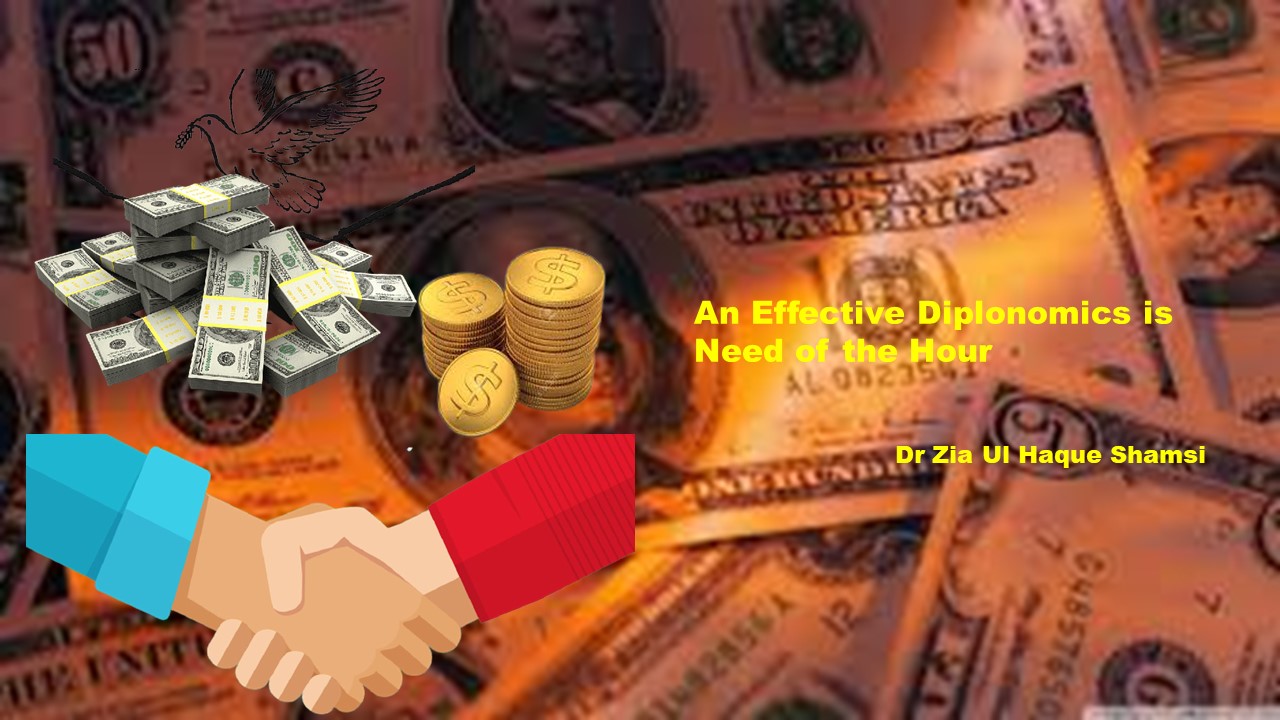The ongoing debate on the transformation of geopolitics to geo-economics is a reflection of policy-maker’s changing priorities due to evolving global and regional dynamics. Geopolitics and geostrategic compulsions have already cost the developing countries enormously. There is mounting recognition to exploit their economic potentials to peoples’ well-being. Moreover, there is ever-increasing realisation to value human security, an essential element of national security, which is hugely dependent on economic security.
The ever-increasing utility of economic diplomacy or the diplonomics, as coined by Sudhir Kumar, in the evolved geo-economic considerations has attained essentiality. The diplonomics calls for productive engagement between interstate and inter-organisational dealings to accrue mutual benefits.
The much-needed economic security can best be ensured through bold economic diplomacy by showcasing the strengths of Pakistan. Pakistan is blessed with a geographical location that makes it strategically relevant, with its amazing topography and climate, best suited for all types of agricultural activities needed to ensure food security for its over 220 million population. Pakistan’s strategic location and vast expanse of fertile land offers numerous opportunities to Central Asia States, Russia and Afghanistan to trade with rest of the world. Perhaps, China recognised Pakistan’s value and launched China-Pakistan Economic Corridor (CPEC), a flagship project of its Belt and Road Initiative (BRI) for mutual benefits.
Likewise, Pakistan offers numerous opportunities for investments in a number areas including exploitation of natural resources. For the purpose, Pakistan’s diplomatic corps needs to showcase the opportunities in an effective manner with requisite incentives to the strategic investors. Moreover, it is necessary to resolve legal issues connected with the Reko Diq case against the Tethyan Copper Company (TCC) so that foreign investors do not feel deterred from coming to Pakistan.
Pakistan’s successful efforts to accrue the benefits from climate-economy can serve as a model for economic diplomacy in other fields of economy. Pakistan’s initiative to offer support, both technical and manpower, to Saudi Arabia in its efforts to greenize the desert kingdom can bring numerous economic benefits for Pakistan, including remittances from the semi-skilled workers.
Unfortunately, international institutions are not so kind to Pakistan and in spite of its near total compliance of the conditions posed by Financial Action Task Force (FATF), it remains in the grey list. While efforts are in hand to remove any legal hurdles, concerted efforts by both economic managers and diplomatic corps are needed to regain the white status, which will be helpful in furthering economic security.
Pakistan has worked hard to regain its lost grounds in essential agricultural produce like wheat, rice, cotton and sugarcane. It is now incumbent upon our diplonomics managers to find non-traditional markets for Pakistan so that our exports improve and the perennial issues of balance of payment is resolved to some extent. Likewise, Pakistan is one the leading producer of the dairy products and according to the Pakistan Dairy Association, its export potential ranges between 28-30 billion USD, however, it actually stood at 680 million USD in 2020.
The successful management of the pandemic crisis has also provided an opportunity to Pakistan’s economic managers to offer our diplomats to showcase our progress in development of medical devices and expertise of our medics.
The incumbent government needs to pursue the mango, olive and honey diplomacy as part of its campaign to achieve self-sufficiency and export the value added products. The incentive models adopted under Make in Pakistan for the Mobile Phones industry and Automobile industry may be replicated in other sectors like hydrocarbon exploration, mineral development, and other large-scale manufacturing.
Tourism is another sector that can attract foreign visitors and investment through effective economic diplomacy. Pakistan has numerous avenues to offer, from religious tourism to mountain tourism, and historical tourism to nature tourism across the length and breadth of the country. Pakistan is home to the birth sites and virtuous places of at least three religions; Hinduism, Buddhism, and Sikhism. If developed, protected, and preserved properly, these religious sites would help our diplomats portray Pakistan’s soft image in ensuring religious freedom for the minorities and attract a large number of devotees every year from all over the world.
In fast-changing global and regional environment, economic security is key to human security and without human security, ensuring national security would be extremely challenging. Therefore, in order to strengthen our economic security, it is necessary that an effective economic diplomacy strategy is formulated and pursued relentlessly by all missions abroad. This would not only help project Pakistan’s soft image but also attract much needed foreign investment necessary to address the perpetual problems of the balance of payment, detrimental to our economic security.
Dr. Zia Ul Haque Shamsi is the author of the book ‘Nuclear Deterrence and Conflict Management Between India and Pakistan’. He is presently working as the Director at the Centre for Aerospace & Security Studies (CASS). The article was first published in Daily Times. He can be reached at cass.thinkers@gmail.com
Image Source: Etfa Khurshid Mirza




